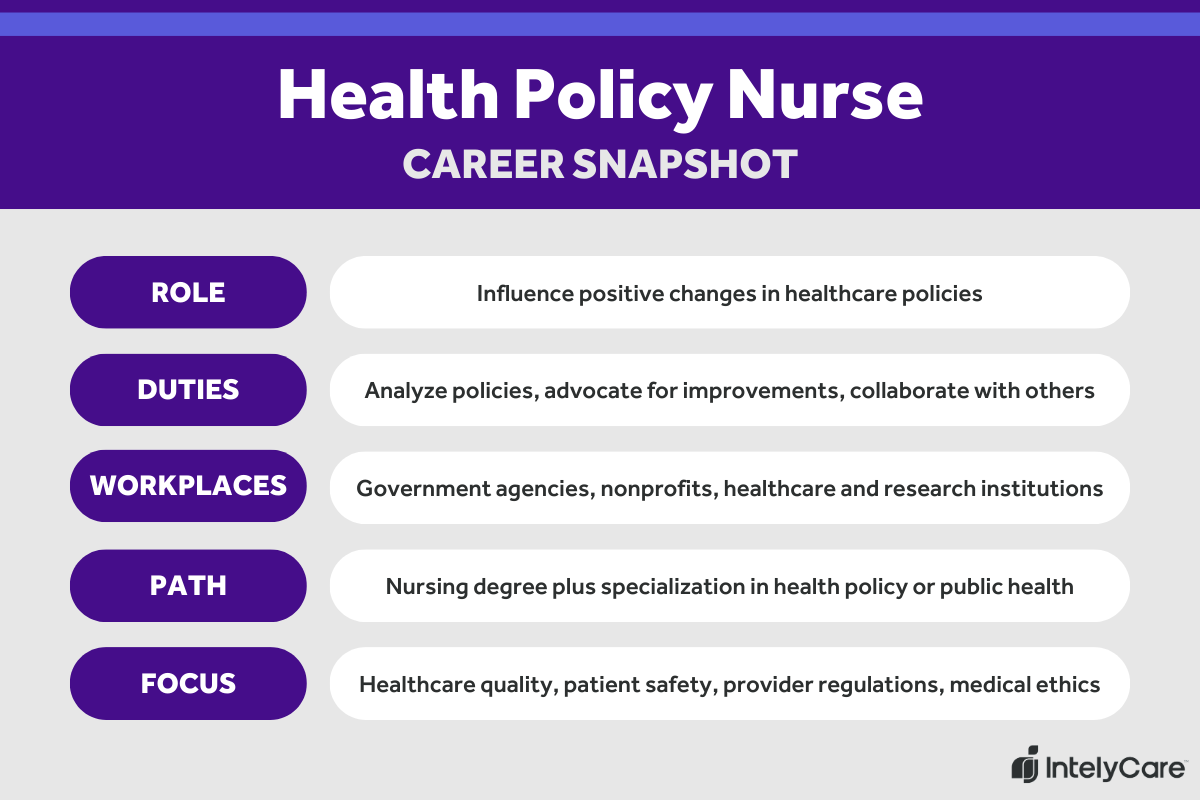How to Become a Health Policy Nurse

In light of ongoing nursing strikes, staffing shortages, and burnout affecting over 76% of nurses, it’s clear — something has to change. And it’s not just healthcare workers feeling this way; more than 70% of Americans feel let down by the country’s healthcare system. The pressing question remains: What improvements can be made?
One way to enact change is to become a health policy nurse — a specialist in healthcare regulations who works to reshape policies and drive positive transformations in the medical field for patients and nurses alike. If you are fascinated by the dynamic interplay of policy and politics in nursing and healthcare, this profession might be a great fit for you.
What Is a Health Policy Nurse?
A health policy nurse analyzes and revises healthcare laws, policies, and regulations at varying levels: governmental, organizational, and institutional. These professionals use their firsthand nursing experience to shape healthcare delivery by advocating for evidence-based policies that serve the interests of patients, providers, and communities.
These nurses can work in various healthcare settings and beyond. Some common places where you might find employment include:
- Community centers
- Consulting firms
- Educational institutions
- Government agencies
- Acute care facilities
- International organizations
- Nonprofit organizations
- Public health agencies
- Research institutions
What Do Health Policy Nurses Do?
How do nurses influence health policy, exactly? They do so by carrying out the following tasks:
- Researching and analyzing healthcare policies
- Monitoring legislative changes affecting healthcare
- Collaborating with policymakers and advocacy groups
- Participating in policy discussions and committees
- Developing evidence-based policy recommendations
- Educating healthcare providers and the public about policy implications
- Evaluating policy effectiveness and advocating for improvements
- Supporting policies that enhance nursing practice and patient safety
5 Steps to Enter the Health Policy Nursing Field
Let’s explore the key steps to start your journey into this meaningful nursing specialty.
1. Earn a Nursing Degree
One way to begin your journey is by earning an associate degree in nursing (ADN) degree. After that, you can advance your education through bridge programs, such as RN to BSN, while gaining the nursing experience you’ll need to work in the field.
2. Obtain Licensure
To get licensed, you’ll need to pass the NCLEX-RN (National Council Licensure Examination for Registered Nurses) and submit all required documentation to your state’s board of nursing. This test ensures that you’re ready to start practicing your recently learned skills as a new graduate nurse.
3. Gain Experience
Gain experience in relevant nursing specialties to lay a solid foundation for transitioning into health policy nursing. Here are some specialties that can prepare you for this field:
4. Attain Health Policy Nurse Certification
Another good step toward this specialty is earning certifications. Here are some certifications that can enhance your nursing application and skills:
- Certified in Public Health (CPH)
- Certified in Healthcare Compliance (CHC)
- Clinical Nurse Leader (CNL)
- Certified in Executive Nursing Practice (CENP)
- Nurse Executive Certification (NE-BC)
You can also advance your practice and professional credibility by attending conferences, joining professional organizations, and taking continuing education courses.
5. Gain Advanced Nursing Degree
In some cases, an advanced degree such as master’s of science in nursing (MSN) or doctor of nursing practice (DNP) is required to work in health policy nursing. Here are some master’s degree specialties you might want to explore:
- Evidence-based healthcare
- Global public health and policy
- Healthcare policy
- Health economics, policy and management
- Public health
What Is a Health Policy Nurse Salary?
The typical salary for health policy specialists, including nurses, in the U.S. is about $88,000. Your earnings might differ based on factors like your educational background, certifications, work experience, and geographic location.
Frequently Asked Questions: Health Policy Nursing
What is health policy in nursing?
Health policy refers to the rules and protocols that guide healthcare practices. Wearing a mask and gloves to prevent infection spread, closing the computer before leaving the workplace to protect patient data, and checking for allergies before administering medication are just a few examples of health policy in nursing.
Why should nurses get involved in health policy?
Nurses are usually the ones on the front lines giving direct care to patients. They see the problems in nursing and healthcare firsthand. By engaging in policy development, nurses can help shape decisions at all levels of healthcare administration.
What are current health policy issues in nursing?
Current health policy issues in nursing include:
- Nurse-to-patient ratios
- Nursing shortages
- Scope of practice
- Healthcare financing and reimbursement
- Technology integration
- Ethical and legal considerations
In what national organizations can health policy nurses work?
Healthcare policy nurses can work in a variety of organizations across the U.S., including:
- Agency for Healthcare Research and Quality (AHRQ)
- American Nurses Association (ANA)
- American Public Health Association (APHA)
- Centers for Disease Control and Prevention (CDC)
- National Institutes of Health (NIH)
In what international organizations can health policy nurses work?
There are no borders for health policy nurses. They can work in a variety of international organizations, including:
- Global Health Council (GHC)
- International Council of Nurses (ICN)
- Partners In Health (PIH)
- United Nations Development Programme (UNDP)
- World Health Organization (WHO)
Ready to Make a Meaningful Impact as a Health Policy Nurse?
There are many ways you can make a difference as a nurse. Need some help getting started? Whatever path you choose, IntelyCare can match you with nursing jobs that align with your career goals.

